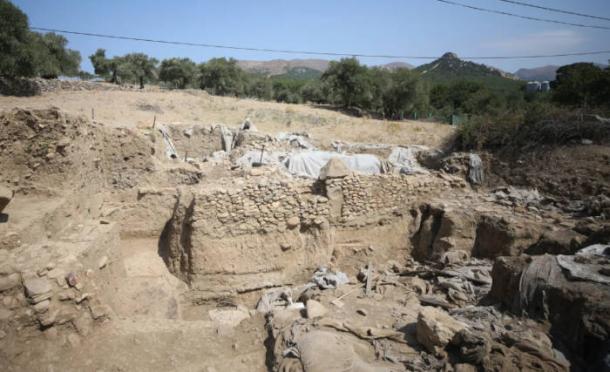Science
Archaeologists Uncover 8,800-Year-Old Farming Houses in Turkey

Archaeological excavations on Turkey’s westernmost island have revealed five circular houses, marking the earliest known agricultural settlement in the Aegean Sea. This groundbreaking discovery at Uğurlu-Zeytinlik Mound on Gökçeada, formerly known as ancient Imbros, positions the island alongside Crete’s renowned Knossos as one of the few Neolithic settlements documenting the initial wave of farming communities to reach the Aegean Islands.
Excavations led by Professor Burçin Erdoğu from Akdeniz University since 2009 have unearthed structures that date back to approximately 6800 BC. Professor Erdoğu described the find as unprecedented, stating, “This type of architecture has been encountered for the first time in the Aegean Islands,” in an interview with Turkish media.
The circular houses feature sunken floors and are built using traditional wattle-and-daub techniques, which involve weaving reed walls and then coating them with mud plaster. This architectural style offers insights into the early agricultural practices of the region, predating most European farming communities by thousands of years.
The implications of this discovery extend beyond Turkey, as it sheds light on the broader story of agricultural development in the Aegean region. This site not only provides evidence of early farming but also suggests that the spread of agriculture may have reached these islands earlier than previously thought.
Excavations at Uğurlu-Zeytinlik Mound continue, with researchers hoping to uncover more about the lives of these early settlers and their agricultural practices. The findings could potentially rewrite aspects of early European history, particularly concerning the transition from hunter-gatherer societies to settled agricultural communities.
As archaeologists delve deeper into this ancient settlement, they aim to piece together the social and economic structures that defined these early communities. The discovery of these circular houses marks a significant milestone in understanding the origins of agriculture in the Aegean and its eventual impact on the development of civilizations in Europe.
The ongoing research at Uğurlu-Zeytinlik Mound promises to offer more valuable insights into the past, highlighting the rich tapestry of human history that continues to unfold in this remarkable region.
-

 Top Stories2 months ago
Top Stories2 months agoTributes Surge for 9-Year-Old Leon Briody After Cancer Battle
-

 Entertainment3 months ago
Entertainment3 months agoAimee Osbourne Joins Family for Emotional Tribute to Ozzy
-

 Politics3 months ago
Politics3 months agoDanny Healy-Rae Considers Complaint After Altercation with Garda
-

 Top Stories3 months ago
Top Stories3 months agoIreland Enjoys Summer Heat as Hurricane Erin Approaches Atlantic
-

 World4 months ago
World4 months agoHawaii Commemorates 80 Years Since Hiroshima Bombing with Ceremony
-

 Top Stories2 months ago
Top Stories2 months agoNewcastle West Woman Patricia Foley Found Safe After Urgent Search
-

 Top Stories4 months ago
Top Stories4 months agoFianna Fáil TDs Urgently Consider Maire Geoghegan-Quinn for Presidency
-

 World4 months ago
World4 months agoGaza Aid Distribution Tragedy: 20 Killed Amid Ongoing Violence
-

 World4 months ago
World4 months agoCouple Convicted of Murdering Two-Year-Old Grandson in Wales
-

 World4 months ago
World4 months agoAristocrat Constance Marten and Partner Convicted of Infant Murder
-

 Top Stories3 months ago
Top Stories3 months agoClimbing Errigal: A Must-Do Summer Adventure in Donegal
-

 Top Stories3 months ago
Top Stories3 months agoHike Donegal’s Errigal Mountain NOW for Unforgettable Summer Views









